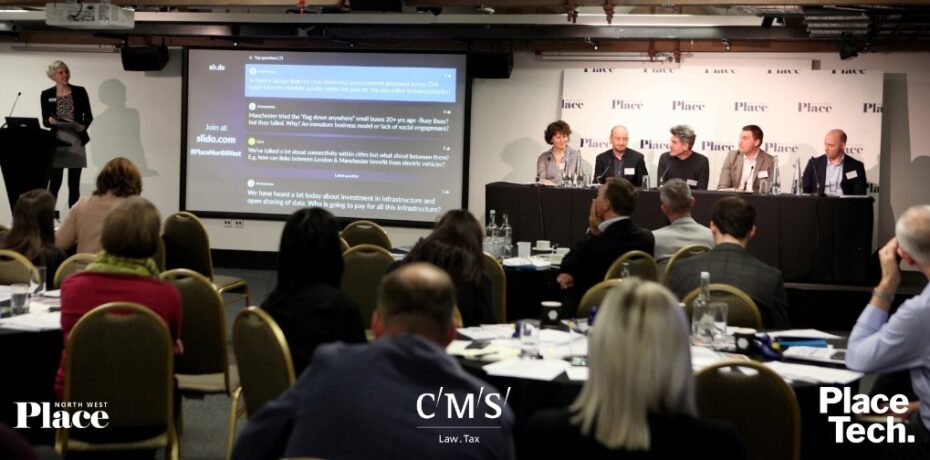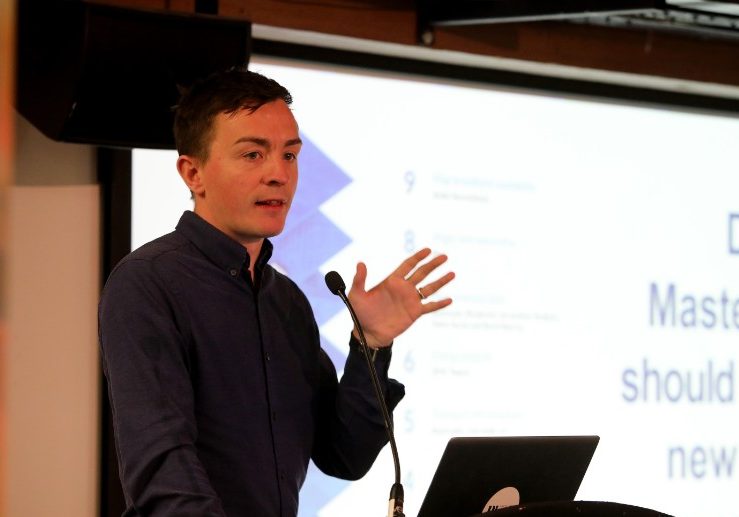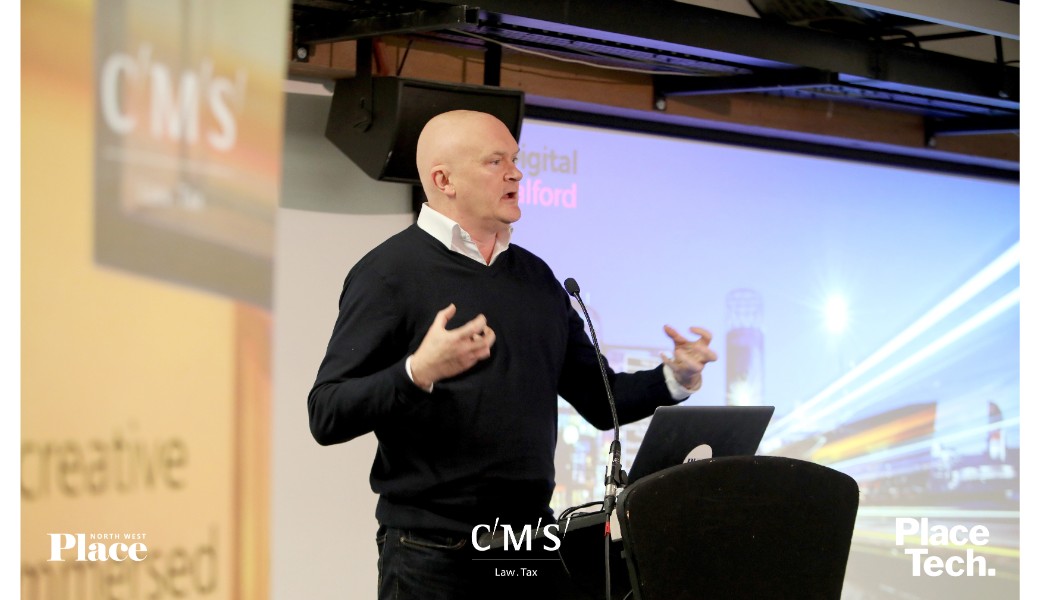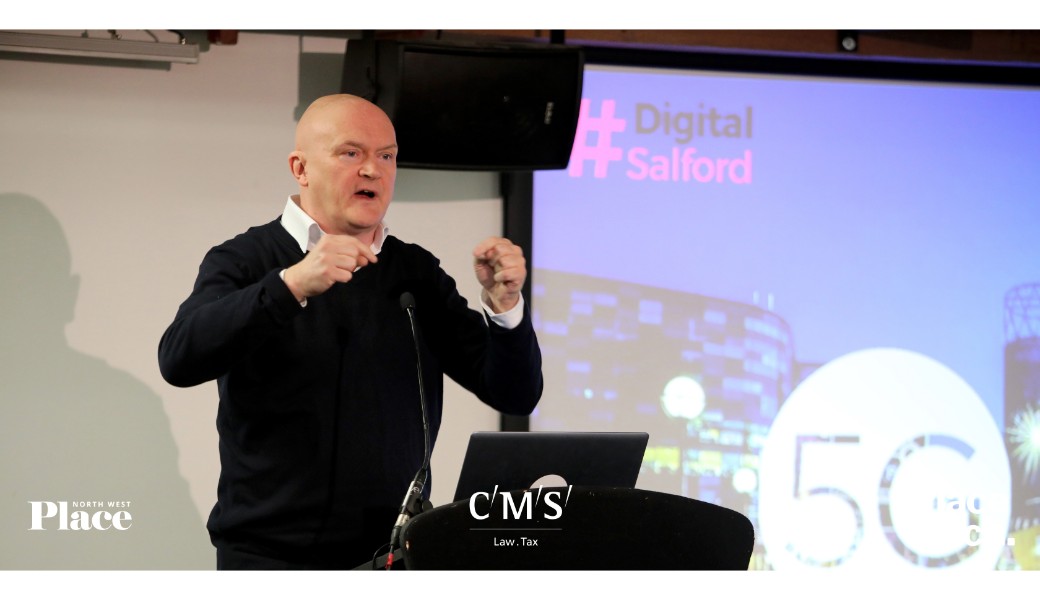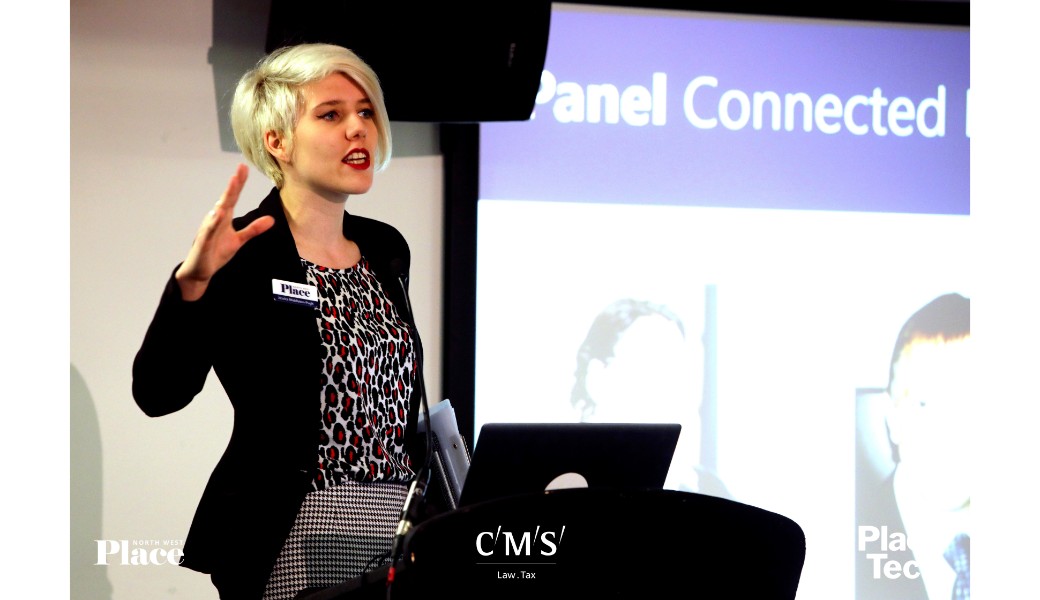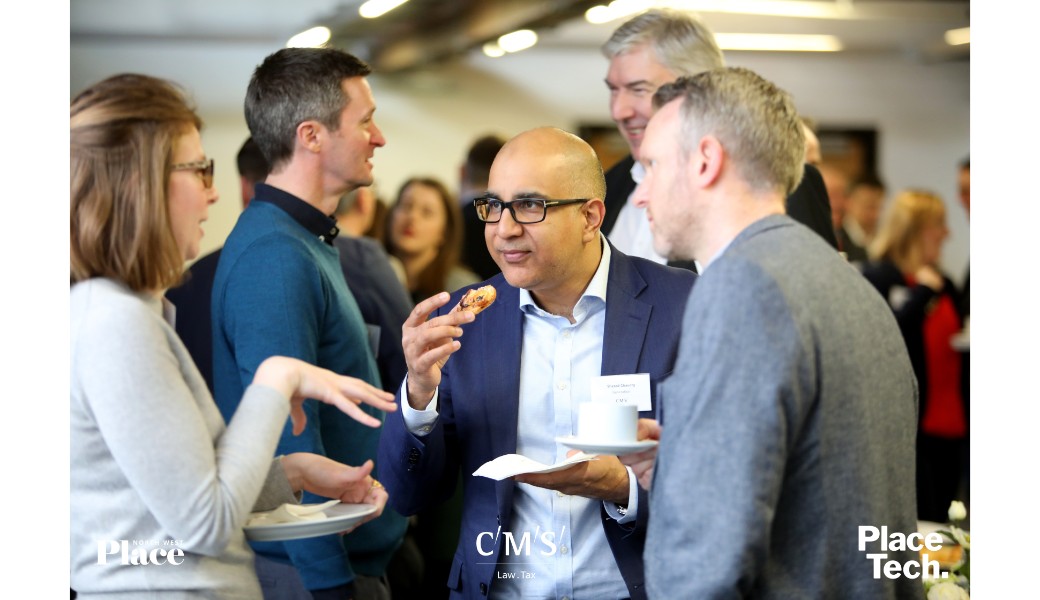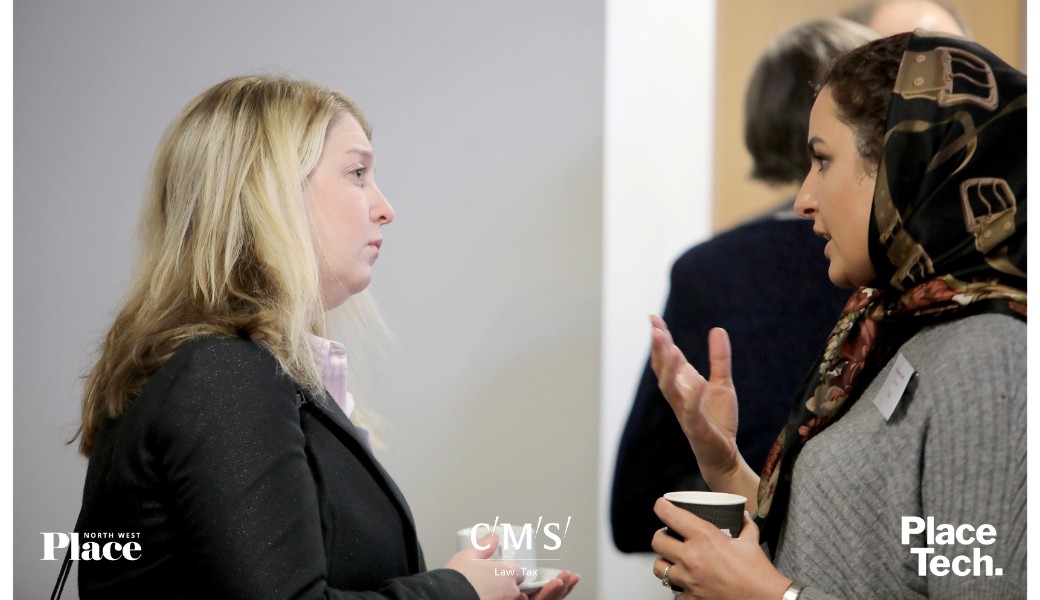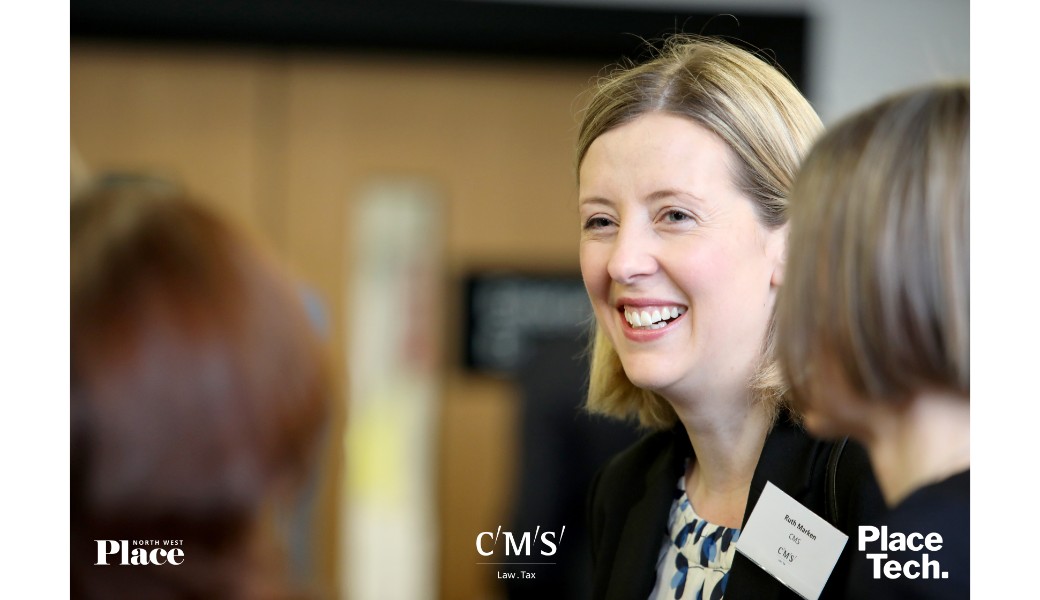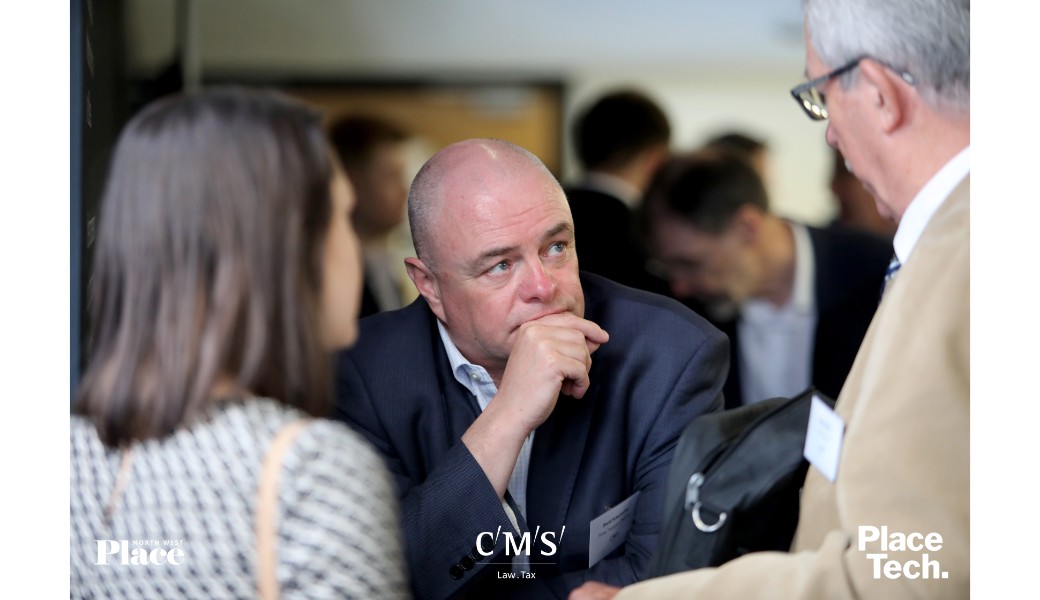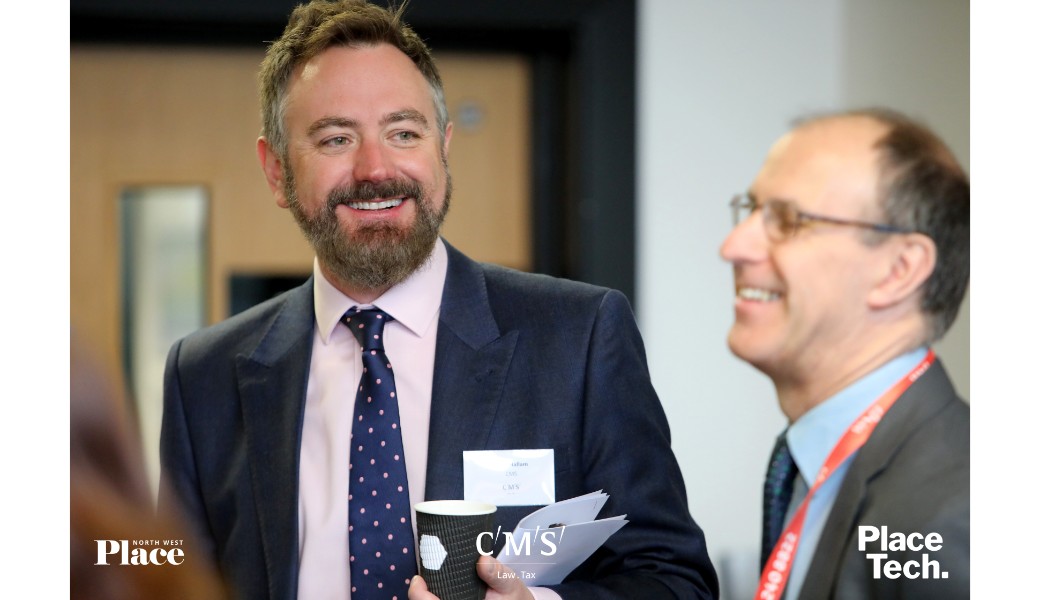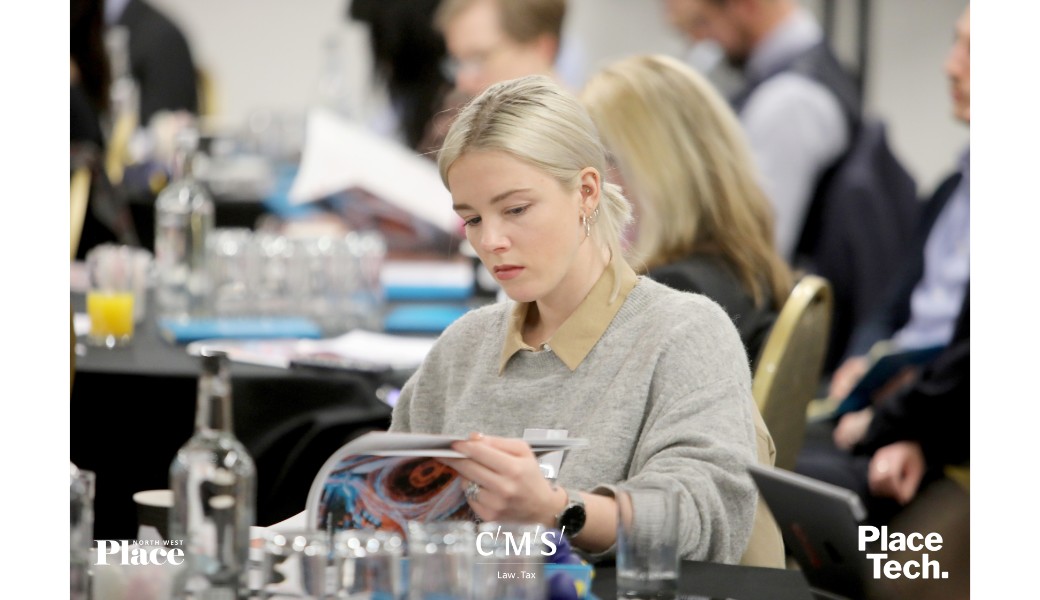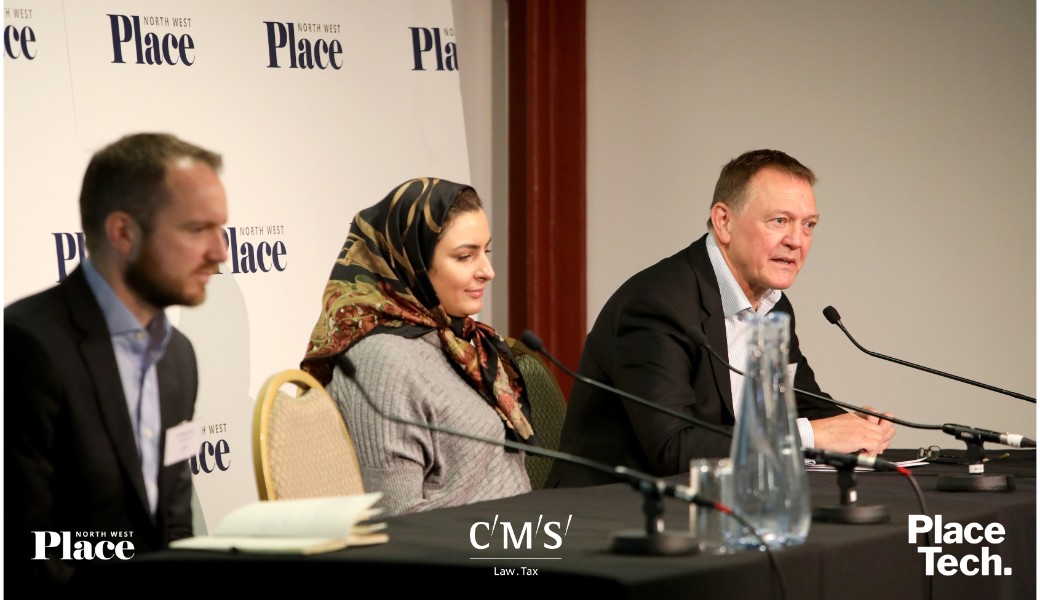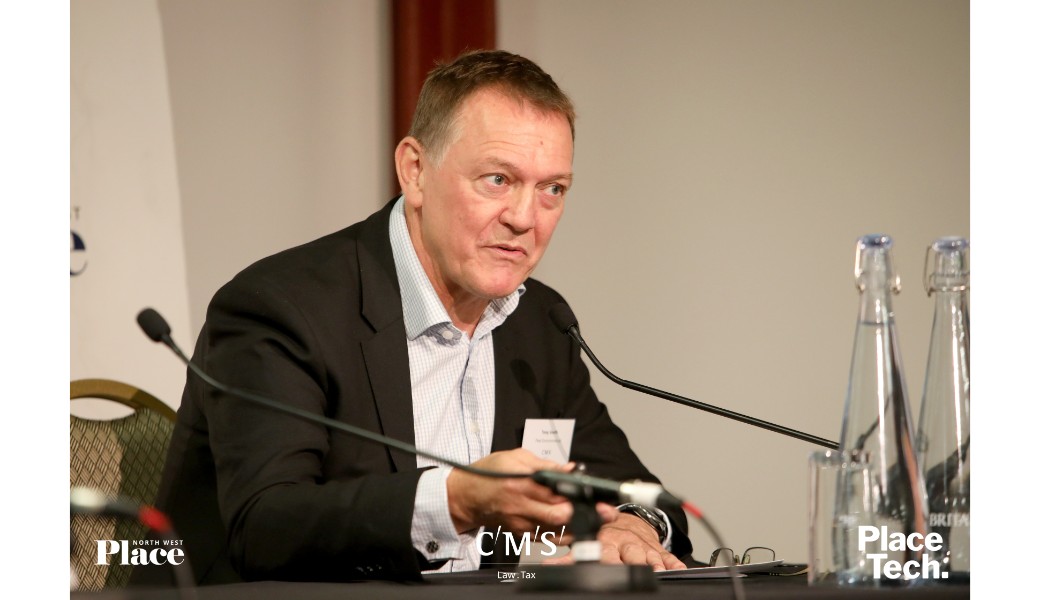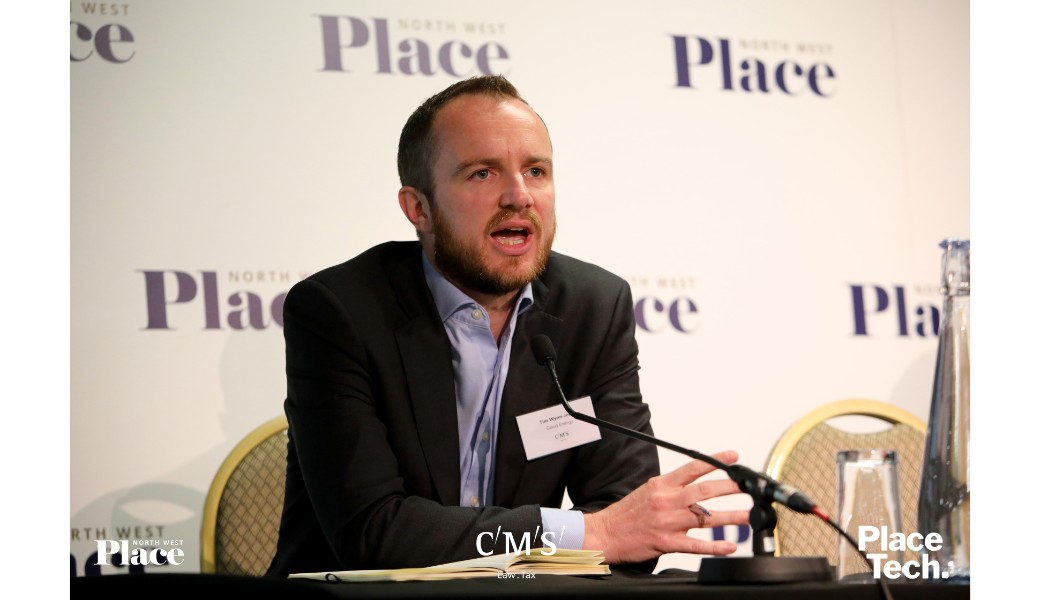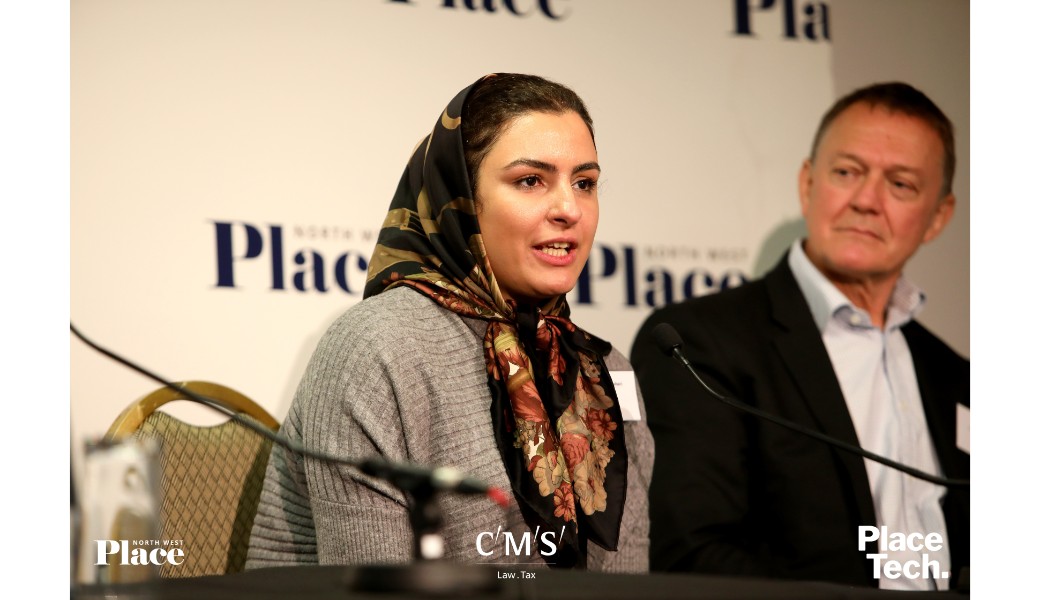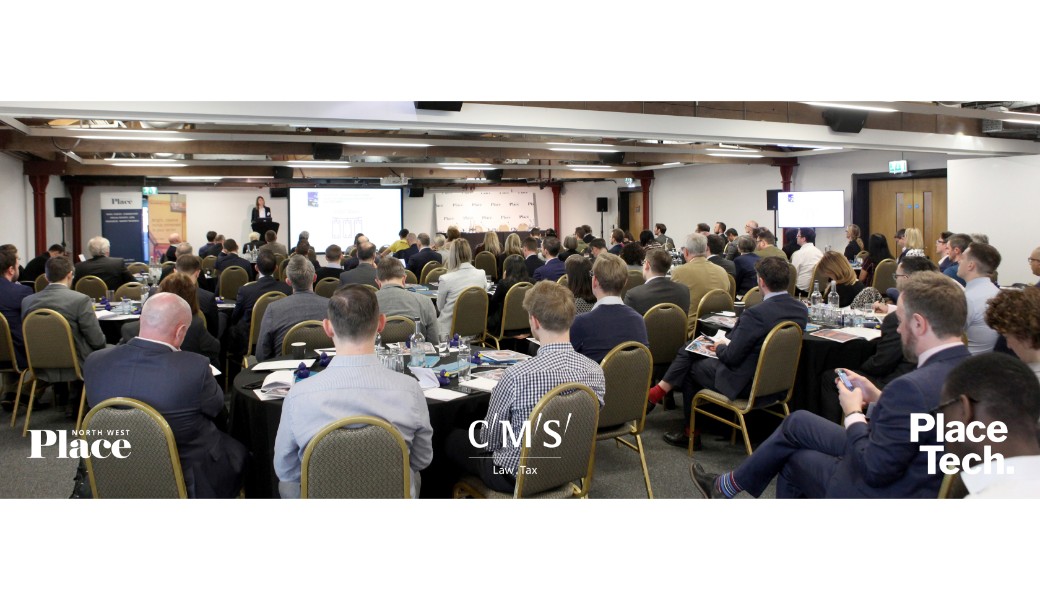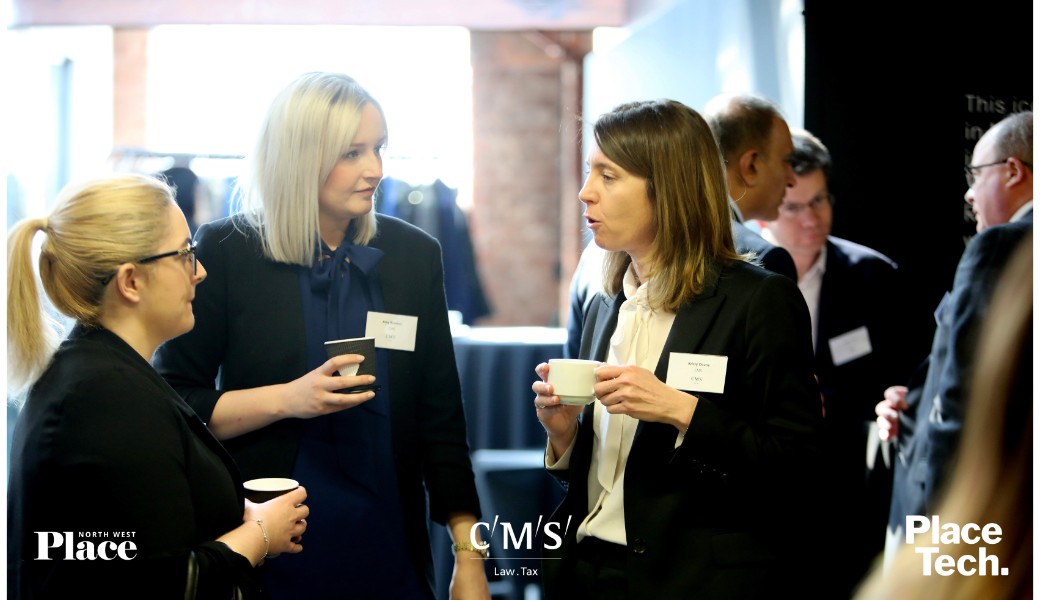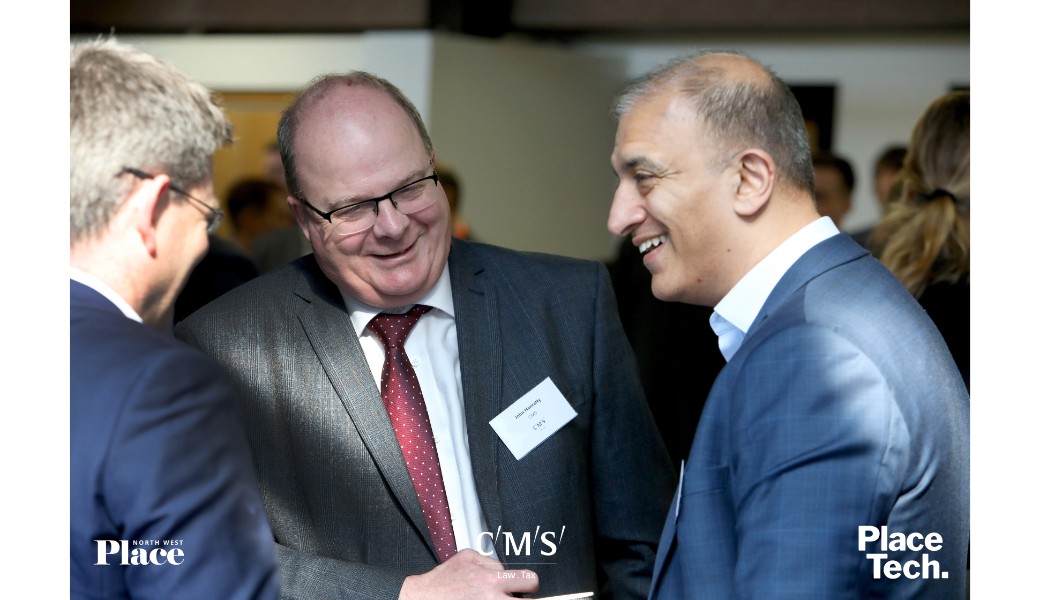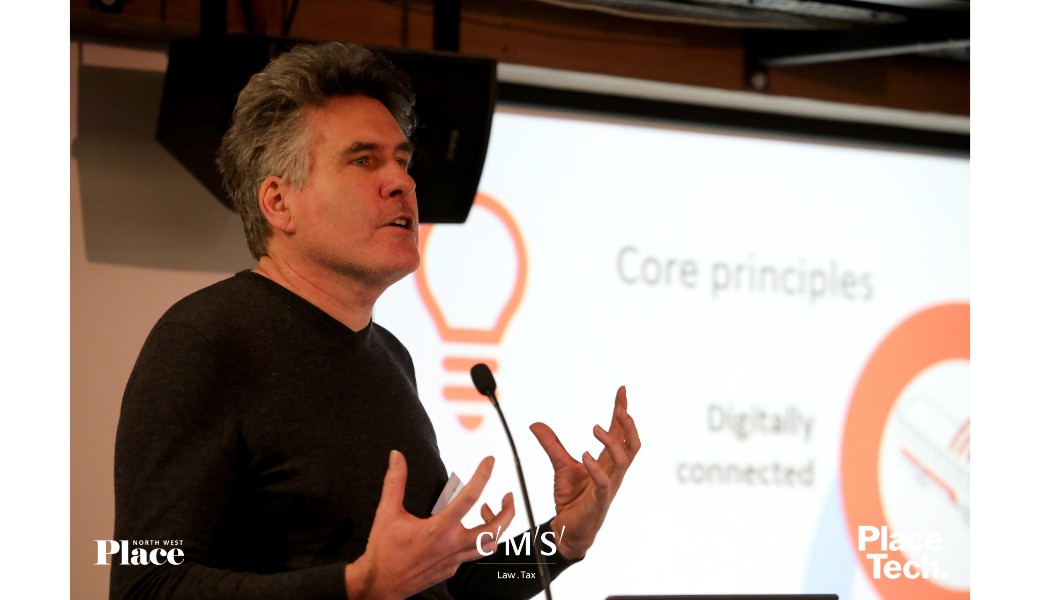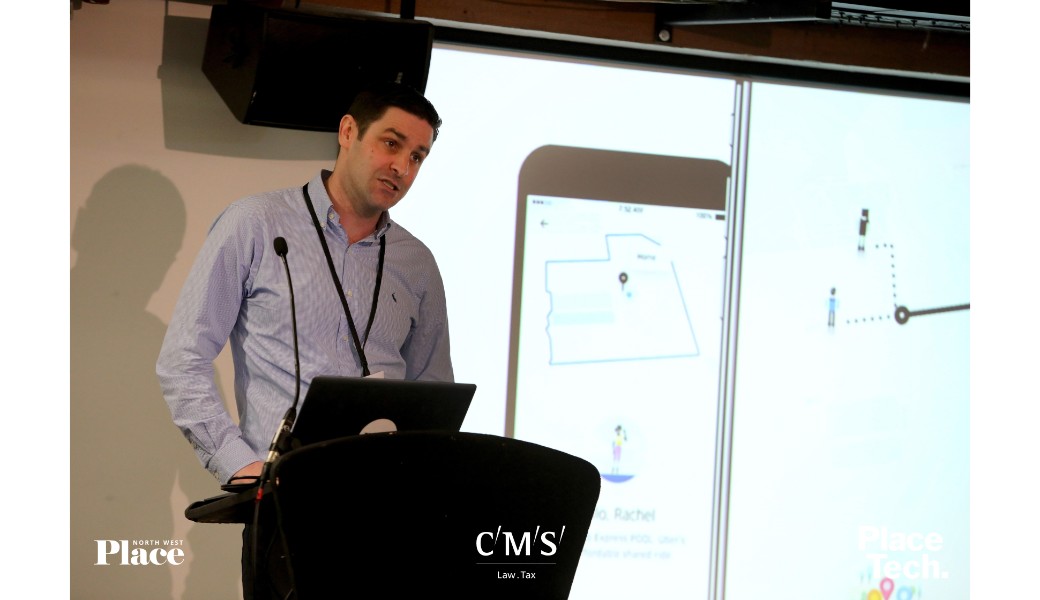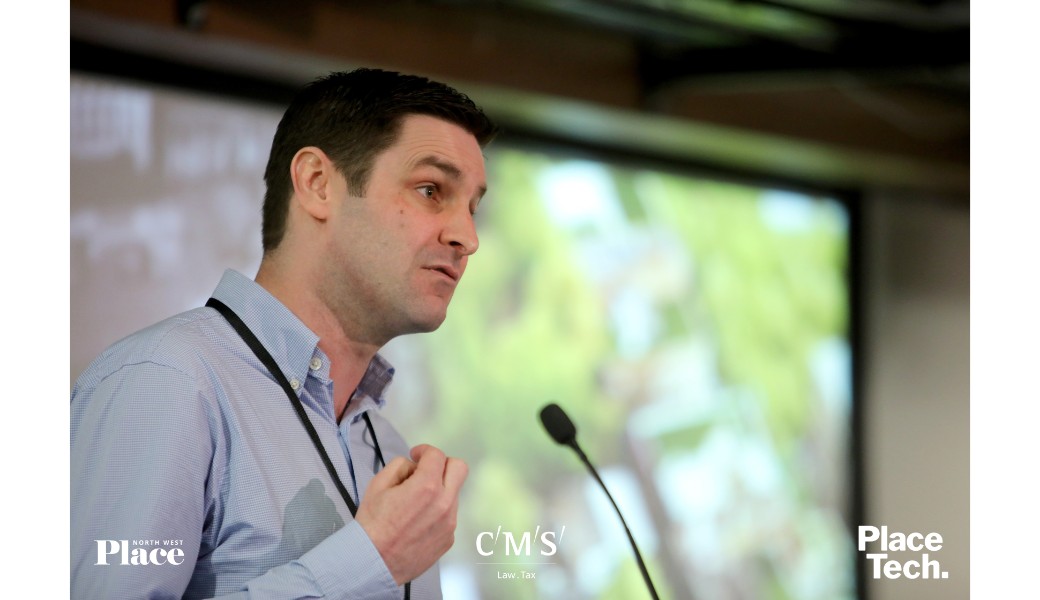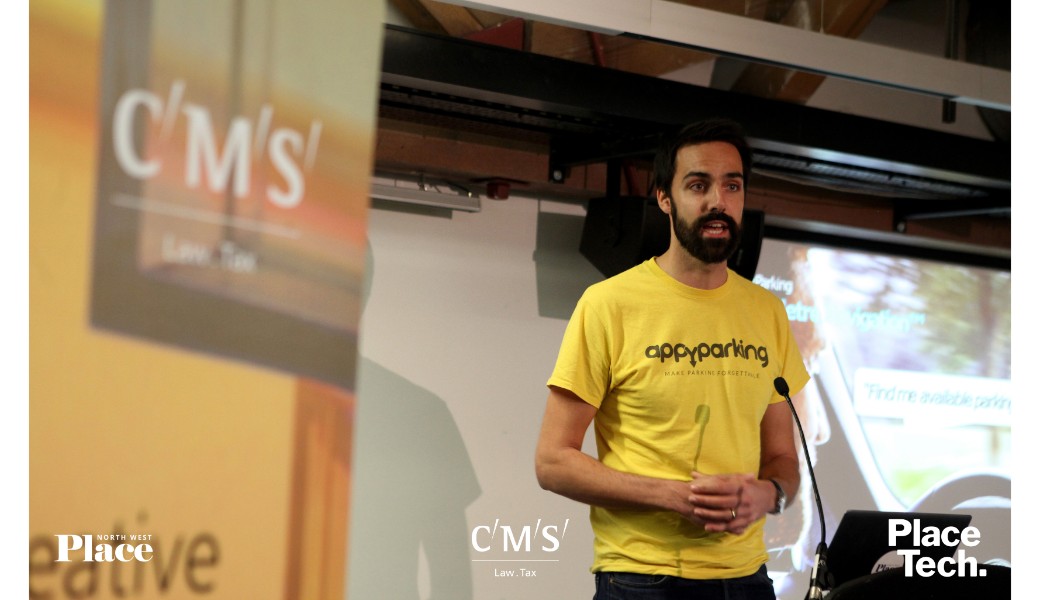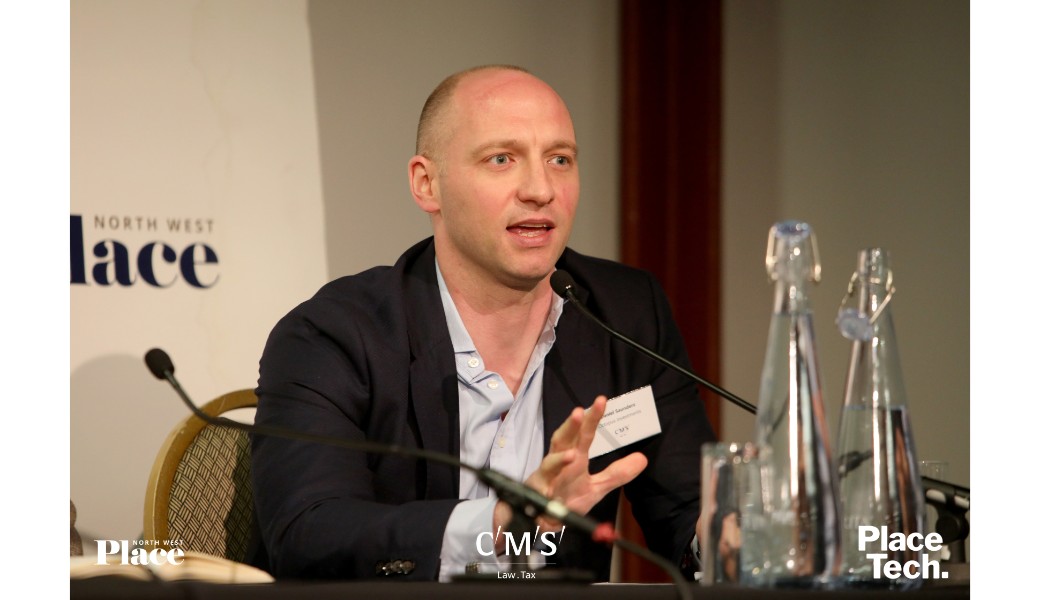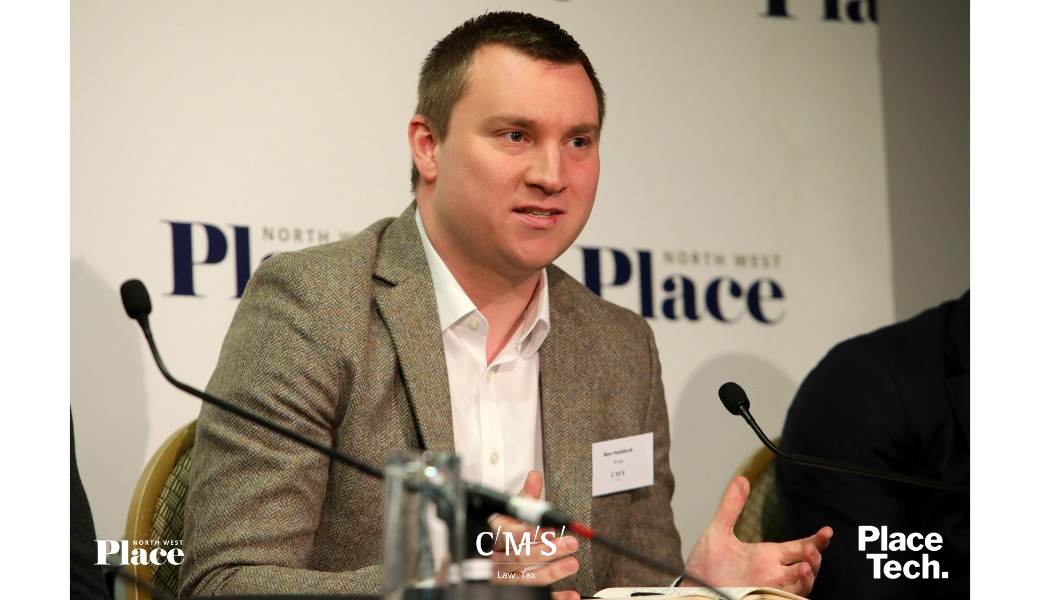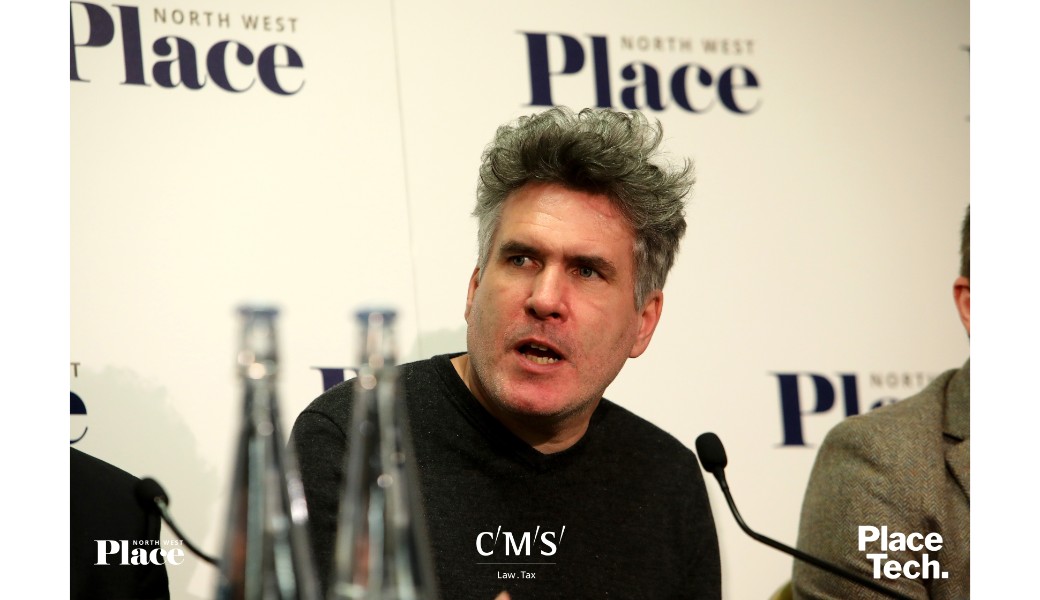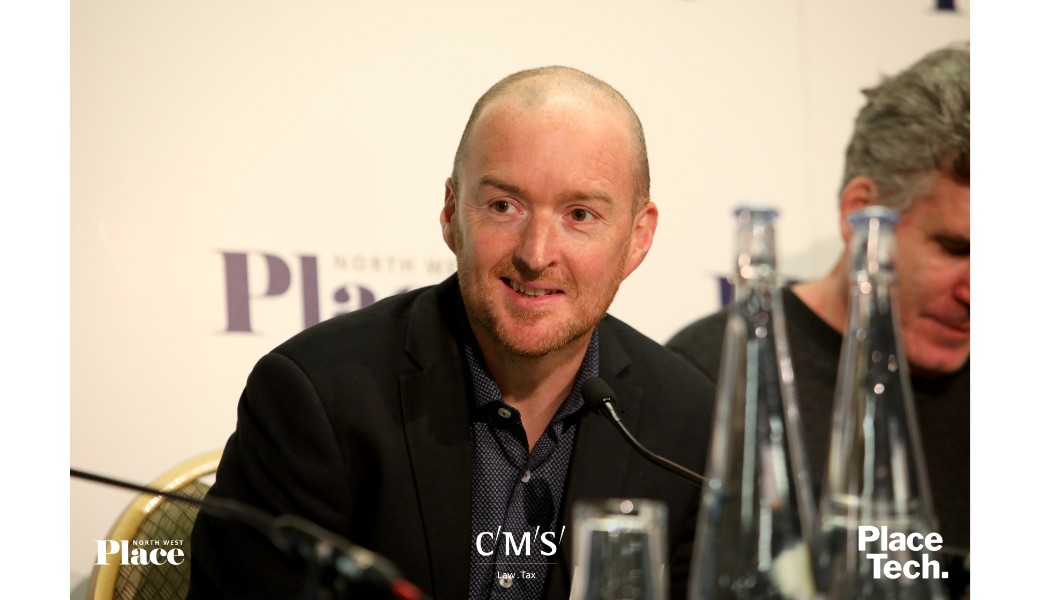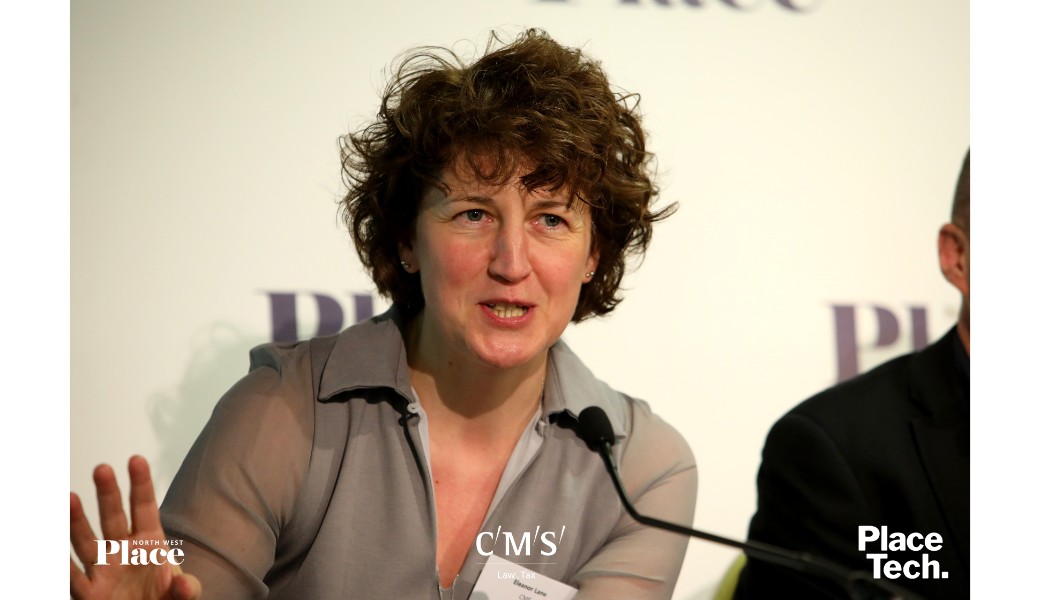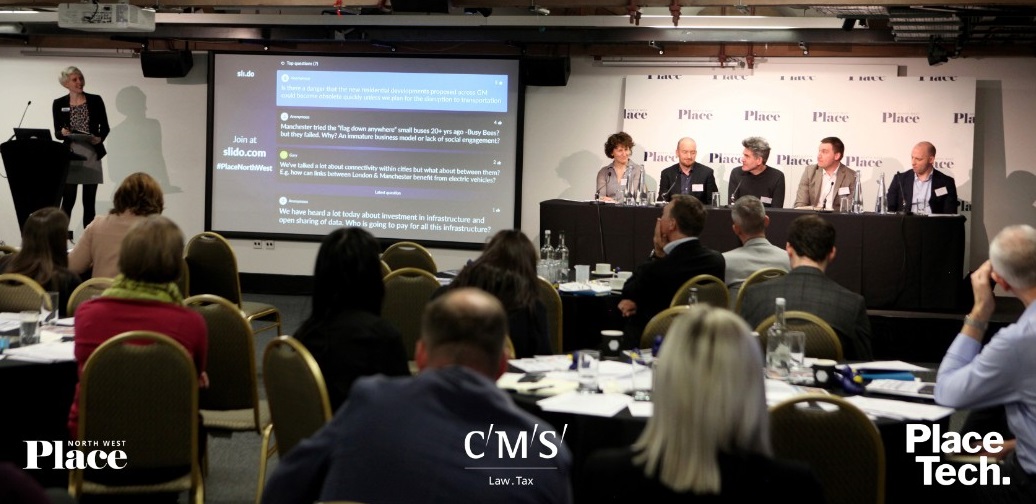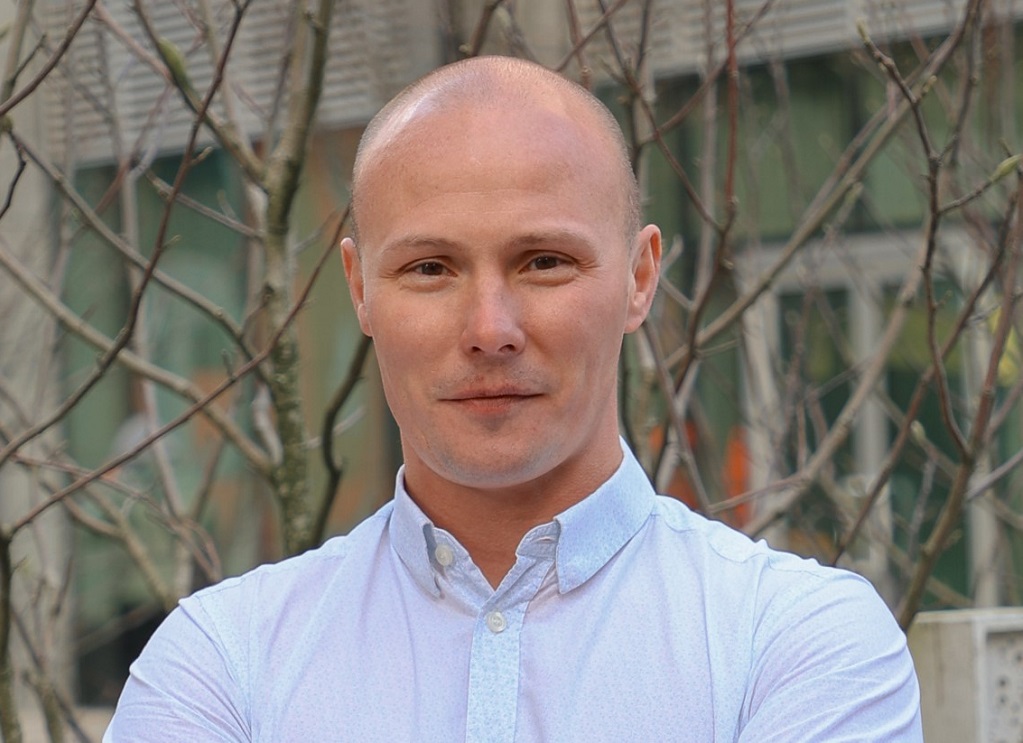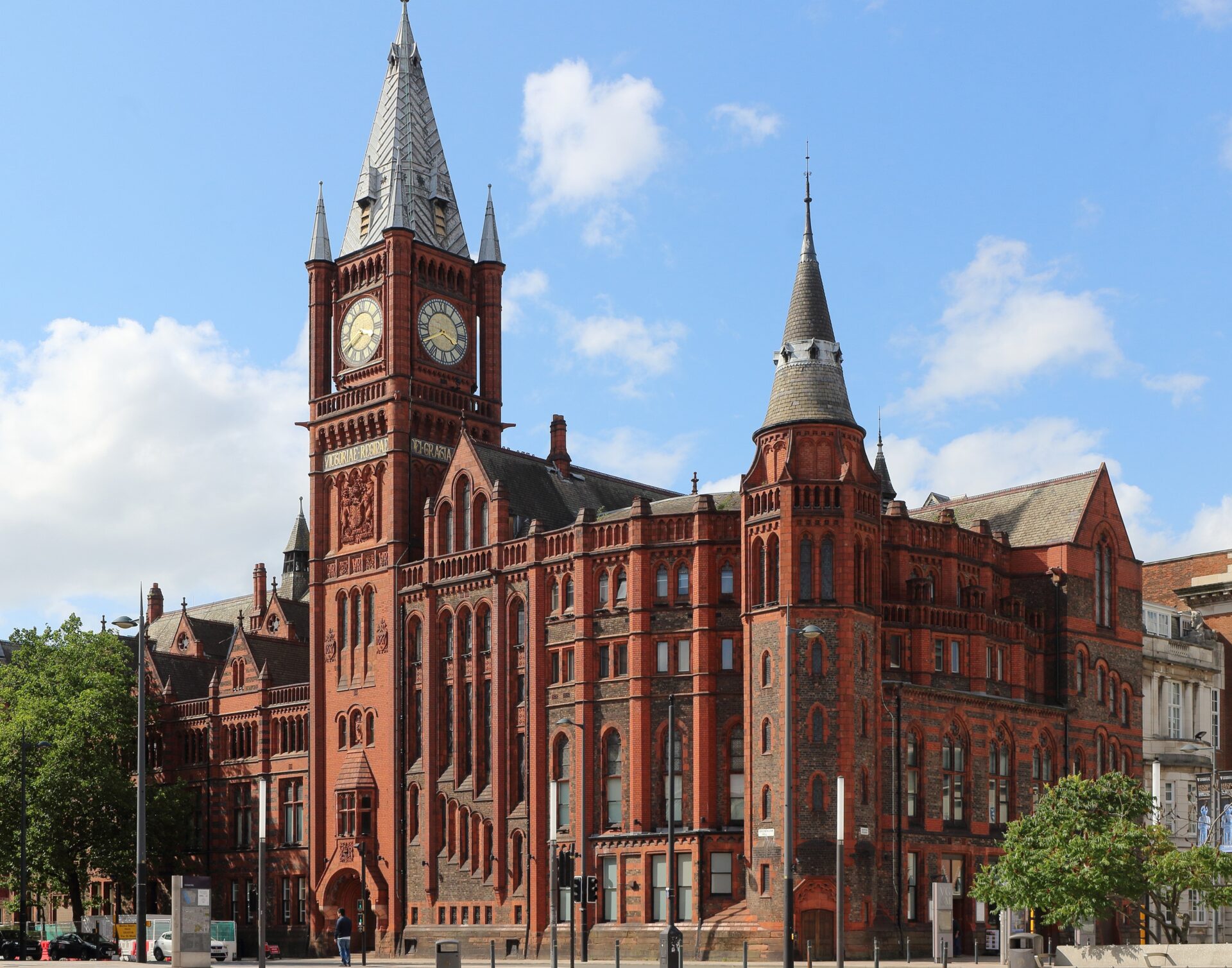Event Summary
Connected Future Cities | Summary, slides + photos
This half-day event in partnership with CMS explored the latest technology revolutionising infrastructure in our cities, including 5G, energy storage, autonomous vehicles, and how property professionals can take advantage of these opportunities.
The event, supported by PlaceTech, saw more than 150 people attended the conference at Manchester’s Science & Industry Museum.
 The speakers were: Kristy Duane, head of infrastructure at CMS; Sean Anstee, chief executive of Telcom; Jon Corner, chief digital officer at the city of Salford; Dr Tony Smith, commercial strategy manager at Peel Environmental; Dr Somayeh Taheri, chief executive of UrbanChain; Tim Wynn-Jones, head of energy solutions at Good Energy; James Kelly, head of cities for the North at Uber; Giles Perkins, head of smart mobility at WSP; Ben Boutcher-West, head of mobility at AppyParking; Ben Haddock, transport associate at Arup; Eleanor Lane, partner at CMS; Simon Navin, head of innovation programmes at Ordnance Survey; and Daniel Saunders, investment director of Octopus Investments. The event was chaired by Place North West’s editor Jessica Middleton-Pugh.
The speakers were: Kristy Duane, head of infrastructure at CMS; Sean Anstee, chief executive of Telcom; Jon Corner, chief digital officer at the city of Salford; Dr Tony Smith, commercial strategy manager at Peel Environmental; Dr Somayeh Taheri, chief executive of UrbanChain; Tim Wynn-Jones, head of energy solutions at Good Energy; James Kelly, head of cities for the North at Uber; Giles Perkins, head of smart mobility at WSP; Ben Boutcher-West, head of mobility at AppyParking; Ben Haddock, transport associate at Arup; Eleanor Lane, partner at CMS; Simon Navin, head of innovation programmes at Ordnance Survey; and Daniel Saunders, investment director of Octopus Investments. The event was chaired by Place North West’s editor Jessica Middleton-Pugh.
Kristy Duane began by exploring the findings of CMS’ recently published report ‘Connected Future’ which looks at digital infrastructure, electric vehicles, energy storage, and smart mobility.
- The UK market for electric vehicles is to hit 12m by 2040, but like all new markets it’s “not perfect”, and “if we’re going to have this level of growth, we will need infrastructure to support it”
- The amount of data that will be generated by autonomous vehicles is “going to be immense, and the way we collate it is going to throw huge security concerns and requirements”
- Altnets, alternative internet network providers, are having their “moment in the sun… They now have access to significant amounts of capital and fibre roll-out is only going to grow”
- Energy storage has become a key aspect for energy resilience. As generation of renewable energy is increasing, so is intermittency, which is a problem for the network, and needs investment: “We’re starting to see shoots of growth, and that’s always evident through debt financing. As soon as banks are willing to lend, you know that the risks are decreasing”
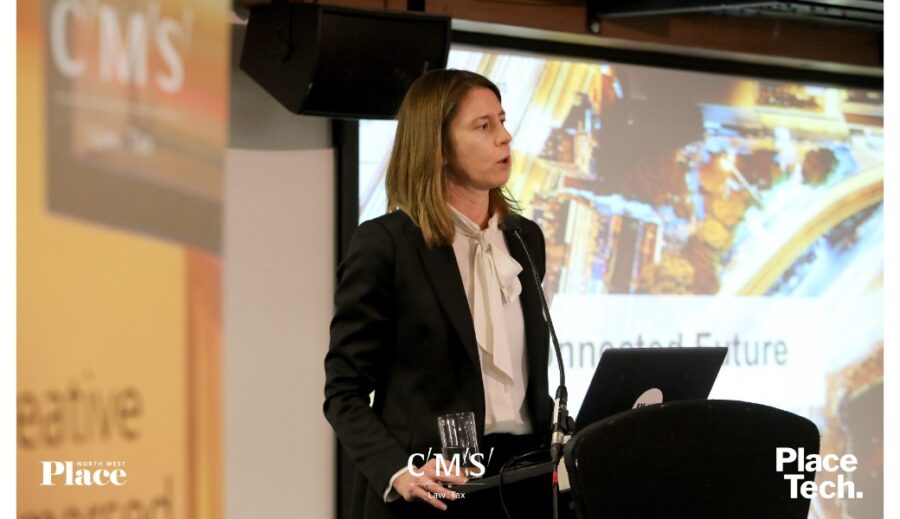
Kristy Duane, CMS
Sean Anstee, chief executive of Manchester-based broadband provider Telcom, shared the group’s desire to ensure that internet is “treated like tap water”, and the importance of digital masterplanning.
- Anstee argued that there’s a lot of work to do to create future cities: “If you’re going to have a city that’s enabled and connected you need to take a close look at building stock, stock which was built a long time ago, pre-internet”
- The mission at Telcom is to “try to build a world where everybody has access to affordable and fast internet. We see it as a basic human right”. He added for cities to reach and realise their “economic aspirations and ambitions, having that infrastructure in place is the only way we can do it”
- The biggest challenge to delivering wide-spread fast internet is: “the inconvenience of putting it in place in the first place, we need to be able to do it once and get it right, and it needs to open for anyone to use”
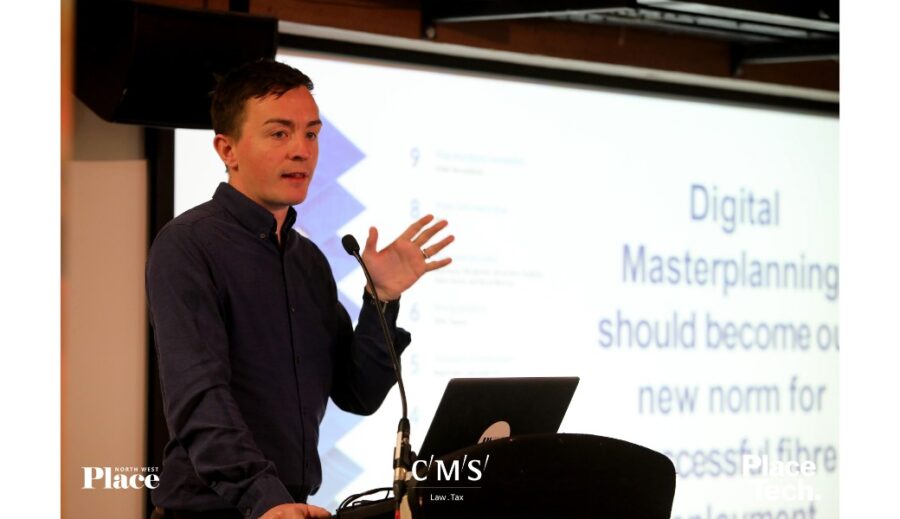
Sean Anstee, Telcom
Jon Corner, chief digital officer of Salford, spoke about full-fibre roll-out across the city.
- MediaCity is a smart city in itself said Corner, explaining there is over “22,000 miles of fibre” in the area and Salford has 25% full-fibre compared to Manchester’s 9%, with one “building management system that controls the area for energy, heating, people flow and parking”
- Corner said there are “more things on mobile networks than there are people and 5G hasn’t launched around the world yet”, and he’s already looking at connecting physical objects, not just cars but places and buildings, using Internet of Things technology via 5G
- He predicted there will be enormous proliferation of virtual and augmented reality: “Engineers will be able to go on site, put on AR glasses and be controlled by someone senior, 100 miles away”
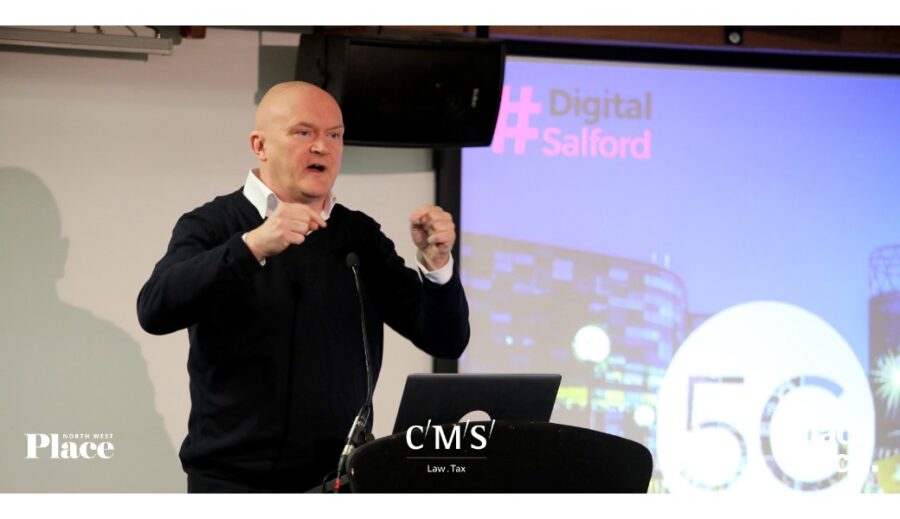
Jon Corner, Salford City Council
Dr Tony Smith, Dr Somayeh Taheri, and Tim Wynn-Jones formed a panel to discuss the energy sector and energy generation.
- Smith said electric vehicles are not a done deal and hydrogen fuel cell technology could be an alternative
- Wynne-Jones agreed, adding that transport towards the larger and heavier end will require hydrogen alongside the electrification of cars, with both being central to decarbonisation of the grid
- Wynne-Jone’s Good Energy is pushing towards a “future where energy users can become energy generators”, through fast networks and software to “intelligently control supply and demand” to balance networks
- Retrofitting tech is expensive said Wynne-Jones, however for a “marginal cost”, developers of new builds and refurbished properties can add “lots more value” by integrating battery storage, to take buildings off the grid during peak periods or provide energy to the grid to help stabilise the network
- Taheri stressed there is a problem with monopolies in the energy sector, and her company’s concept of using artificial intelligence and blockchain to replace the role of suppliers is like presenting the “concept of Uber to black cabs”
- Wynn-Jones said roll-out of smart meters is essential, but the first phase had been executed poorly, with the tech becoming out of date as soon as it’s installed
- Smith was convinced of the value of blockchain and intelligent energy management, however he argued that you have to have energy in the first place and the sector needs to “get real on the supply side as well as the demand”
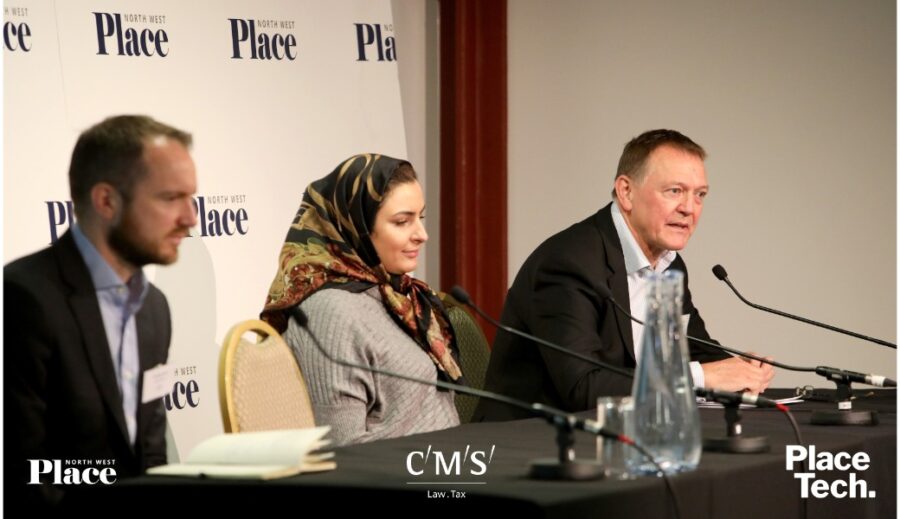
Left to right: Tim Wynn-Jones; Somayeh Taheri; Tony Smith
Giles Perkins from WSP took to the stage to explore the direct link between land use and electrification & decarbonisation, changes to mobility needs and automated vehicles.
- “Major corporations are now realising their role in decarbonisation. Look at what’s happening with car adverts at the moment, Peugeot are running an advert for autonomous vehicles that you can’t even buy yet”
- The lines between public and private transport are changing. Liverpool’s ArrivaClick buses allow users to hail a bus at any time, and he believes by using this could “unlock rural communities”
- Mobility needs are changing. Perkins said, “by 2037 40% of people in Somerset will be over 65”. He warned there’s a danger of exclusion, as “commercial entities go for low hanging fruit” and there’s a “real worry” people can get left behind
- The importance of data in the transport ecosystem is huge for both operators and customer stressed Perkins: “the key change is going to be the digitisation of the road: the link between the vehicle, asset and the customer”
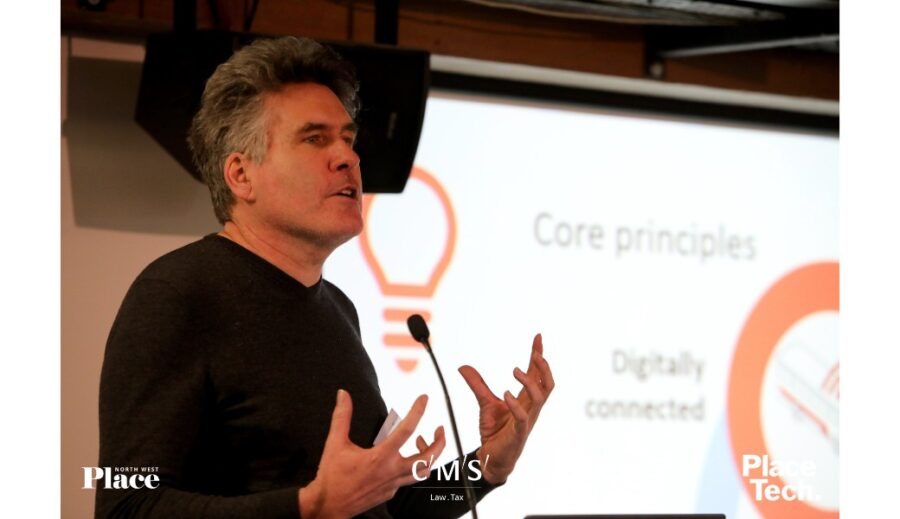
Giles Perkins, WSP
James Kelly from Uber presented on how the transport company is helping deliver the future of mobility and how they’re working with cities.
- “We want to change the way people think about transport. We want to change the default of one car per person,” said Kelly
- “The potential benefits of shared vehicles are enormous”, adding that if people shared cars there would only need to be 10% of vehicles on the road that we have today, and it’s going to be “essential to see the benefits of autonomous vehicles”
- The firm is also working with the private residential sector, including Moda Living in Liverpool, offering credits to people forgoing a parking space and freeing it for a better use
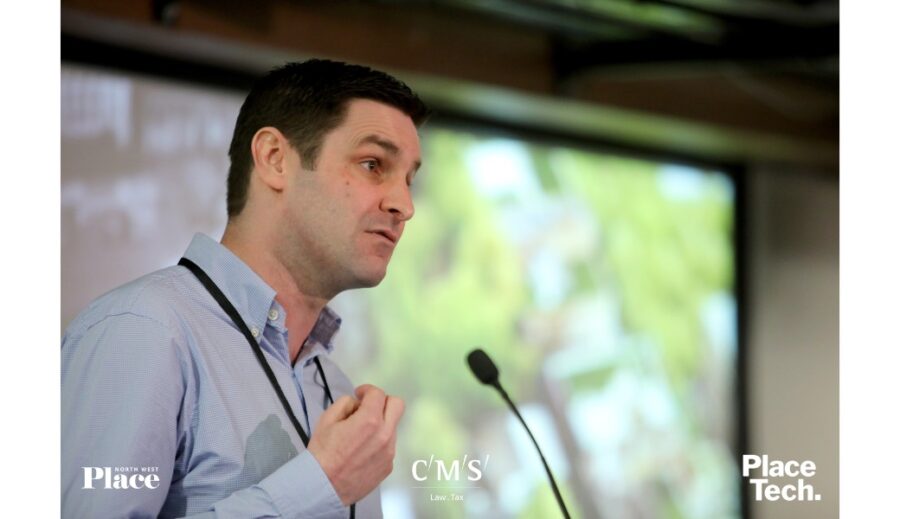
James Kelly, Uber
Ben Boutcher-West, head of mobility at AppyParking, presented a speed pitch on the data driven mobility platform.
- The mission of the tech company is “to make parking forgettable” by preparing cities for the digital revolution
- AppyParking uses sensors which launches an app in a car, and with a click of a button users can start parking with it ending automatically when they leave
- Boutcher-West added the app “empowers the Government” with the tools and services to access digital kerbside management and provides “honest transparent data into consumer services”
- The app is launching in five cities this year, having launched in Harrogate in January, where within eight days the tech company had 6% of the cashless parking market
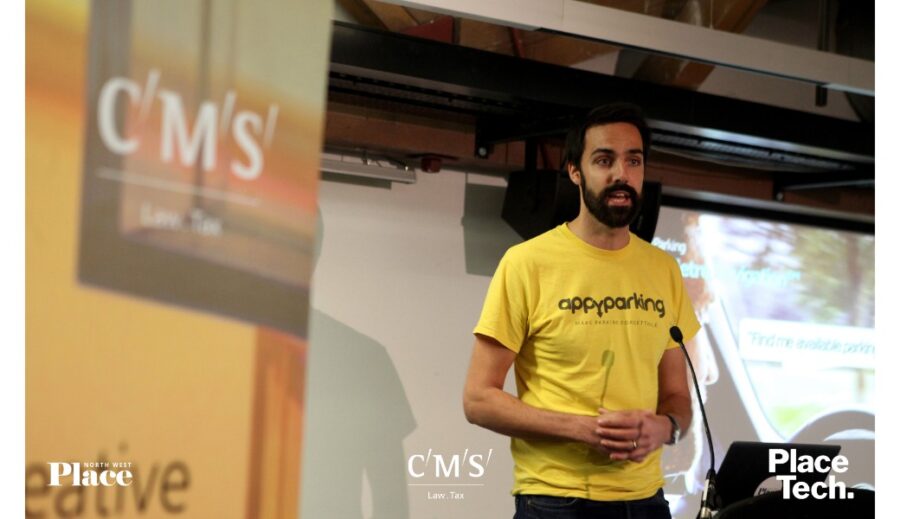
Ben Boutcher-West, AppyParking
Giles Perkins returned to the stage to form a panel with Ben Haddock, Eleanor Lane, Simon Navin and Daniel Saunders.
- Lane said the public sector had traditionally held information on travel behaviour, and decided where to share it, however as more private sector companies move into the transport sector, “who has control of that data, and how is that data used?”
- Haddock explained that Arup is helping private developers to plan future developments, working with Manchester City Council and Far East Consortium for a masterplan for over 15,000 homes, with a “focus on connectivity and green links”
- One of Perkins’ “real beefs” is “we’ve been too hung up on is it a bus, is it a taxi, is it a train. We need to move to how people are accessing opportunities,” and a “choice-led environmentally friendly carbon neutral approach”
- Navin thought data exchange is necessary for the sector: “None of these companies, technologies and outcomes will be realised without good sharing of data,” and “99% of infrastructure will benefit from a digital twin”
- Lane highlighted there is increasing concern around cybersecurity and autonomous vehicles. She added: “It’s balancing a tailored service, the right to privacy and overlaying that with those that don’t want to participate in data sharing, or can’t”
- Saunders thought “transport is facing the perfect storm at the moment. Less and less people want to own vehicles, they just want to get across cities in the easiest way possible”
- “The most vulnerable in society are relying on public services, buses will still have a part”, added Haddock highlighting Liverpool’s recent investment in new hydrogen buses
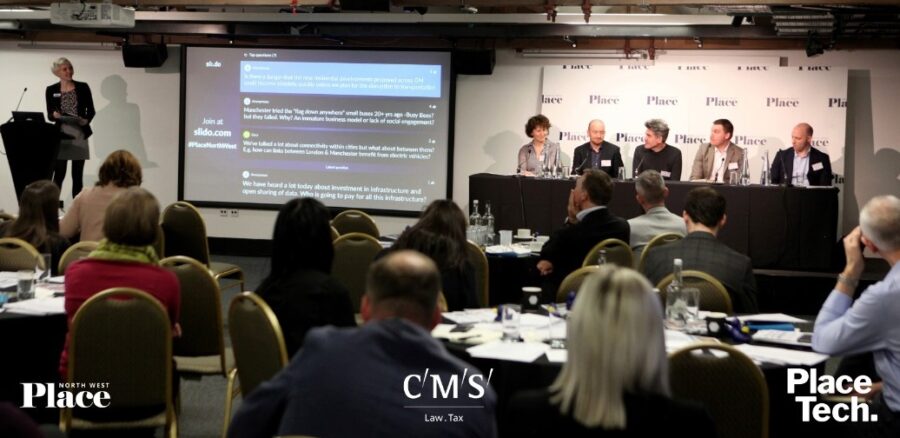
Left to right: Eleanor Lane; Simon Navin; Giles Perkins; Ben Haddock; Daniel Saunders
The presentations from the day can be accessed here:
Click any image to launch gallery
- Kirsty Duane, CMS
- Sean Anstee, Telcom
- Jon Corner, Salford City Council
- Jon Corner, Salford City Council
- Jessica Middleton-Pugh, Place North West
- Left to right: Tim Wynn-Jones; Somayeh Taheri; Tony Smith
- Tony Smith, Peel
- Tim Wynn-Jones, Good Energy
- Somayeh Taheri, UrbanChain
- Giles Perkins, WSP
- James Kelly, Uber
- James Kelly, Uber
- Ben Boutcher-West, AppyParking
- Daniel Saunders, Octopus Investments
- Ben Haddock, Arup
- Giles Perkins, WSP
- Simon Navin, Ordnance Survey
- Eleanor Lane, CMS
- Left to right: Eleanor Lane; Simon Navin; Giles Perkins; Ben Haddock; Daniel Saunders


